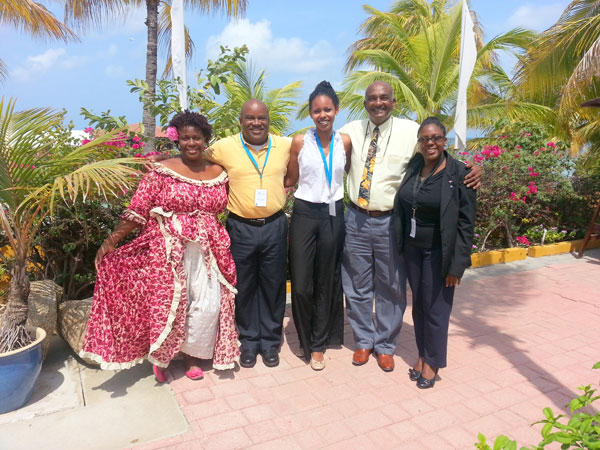St. Maarten Attends UNESCO Cultural Heritage Workshop
PHILIPSBURG, St. Maarten - St. Maarten was represented at UNESCO’s Intangible Cultural Heritage Convention held in Aruba on April 16. The island was represented by Melanie Choisy, Clara Reyes, Marcellia Henry and Neville York.
The Country report of St. Maarten began with an introduction by Clara Reyes in the form of a song, which touched on all the information that had been passed on to her. This was as an example of how fragile St. Maarten’s intangible heritage is resting in the soul and body of usually one person in the community, and the need for that knowledge to be imparted and made accessible to the public in order for it to continue surviving, it was stated in a press release.
“This approach and style drew a guhe round of applause. At the end of her introduction, Clara smoothly transitioned into introducing Melanie Choisy, who captured the minds and hearts of the audience with her in-depth knowledge on the subject of Intangible Cultural Heritage.”
Choisy explained that St. Maarten Intangible Cultural Heritage was much alive; ened by the rapid growth and tourism development on the island. She showed photos of practitioners performing the Porum Dance, Steel Pan, String Band Music, Culinary Arts and Marking of Fish Pots etc.
A number of activities were mentioned, such as the launching of the “Decade of Revitalizing our natural and Cultrual Heritage 2013-2023″ with the Cultural Calendear, Diamond 26 Run for Freedon, DOW’s Pan in Paradise and the Commermorative walk for the Treaty of Concordia and Celebrating St. Maarten’s Traditions in summer camp of 2012, etc.
She Ponted out that laws ought to be enacted to protect and safeguard the Intangible Cultural Heritage, and not the contrary in reference to serenading where the laws have threatened to kill such an important part of our heritage of going house to house and door to door serenading during the Christmas season.
The use of modern technology was also brought forward to illustrate the need to engage the youth, however, not necessarily through the conventional traditional ways and means, but to use modern technology, such as Facebook, twiter, black berry messenger, instant messaging, blogs, etc., which are all free to interface tradition with modernity and the youth.
She said persons should not be afraid of change, because culture is always evolving, “So, from a youth perspective, I’d like to put a stop to the lamenting of those who say the dance hall music is overshadowing the calypso, so that’s why the art form is dying in our country.” “No! We are living in a golobalized world, inundated with flashy images causing the youth to have a very short attention span for things that they may not consider fun or interesting from the offset,” she said. “We need to be able to ccommunicate with the youth in their own langyage, in order to alter their perspectives and attitudes. We need to be albve to pick these eggs up off our backs and put them in a place for the future benefit of our countries.”
The audience had many questions for her at the end of her presentation. In commenting on St. Maarten’s impact at the forum, Education Minister Silveria Jacobs siad: “St. Maarten and the Ministry are on the right track by supporting the youth and making them active participants of the future. After all they are our future.”
Jacobs said it is all about engaging persons of St. Maarten, home and abroad, who have St. Maarten at heart and harnessing our energies and talents in a positive direction in the benefit of country. Dwight Barran, who currently resides in Aruba, recorded the session.
The workshop focused on making sustainable, concrete, cooperative agreements referencing the implementation of the Intangible Cultural Heritage Convention within the Kingdom of the Netherlands in the areas of: Establishing knowledge networks and one or more inventories. It was also aimed at making an action plan on how to realize the agreements made and drafting a capacity-building programme for the Caribbean region of the Kingdom and Suriname, financed by UNESCO’s Intangible Cultural Heritage Fund, which was made possible through the financial contribution of the Ministry of Education and Science of The Netherlands.
THE DAILY HERALD, April 19, 2013


